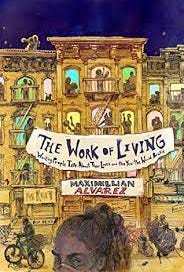YDKH Book Review: "The Work of Living: Working People Talk About Their Lives and the Year the World Broke," Maximillian Alvarez, OR Books, 239 pages
History isn’t just studying dates and times from hundreds of years ago. History is a discussion, one that involves important events throughout all time, and I think we all can agree: the COVID-19 pandemic is something that qualifies as a historical occurrence, even though it was only a few short years ago that it began-and we’re still struggling through it.
Maximillian Alvarez, the Editor-in-Chief of the Real News Network and the host of the “Working People” podcast, decided to delve into this history making event through the lens of working class people. Each chapter (10 total) is dedicated to an individual he interviewed. The book opens with Nick, a grave digger from New Jersey; Duane “Chili” Yazzie, a member of Navajo Nation; and it ends with Mx. Pucks, a burlesque performer from Seattle. Each interview presents an amazing presentation of a cross section of the country, which is great for the reader: you get exposed to different people, and throughout the reading, you find a connection with each and every person.
If there is one thing I’ve noticed, between listening to “Working People” and reading the book, it’s that Alvarez can conduct an interview. Because of the pandemic, the interviews were conducted remotely, but that had zero effect on the interviews themselves. Alvarez put the interviewee at ease, and they were open, honest, and frank discussions about their work, how COVID affected their lives, and everything else that they talked about. Even just reading the book, you could tell that it wasn’t so much an interview, but a recorded conversation that both sides truly enjoyed.
As I said before, reading each chapter you find yourself in the shoes of the subject. If you’re in healthcare, you get to meet Zenei Triunfo-Cortez, a nurse in California. Working in a state that was one of the hardest hit by COVID, you can read the pain that she experienced trying to balance the needs of her job, and her family life. Kyle, a union sheet metal worker from Louisville, explains how he tried to balance a state government that was completely lost as to how to react to the pandemic, and how to provide for his family. Are sheet metal workers essential? Should he sit out to protect his family, or continue to work? These are all things that we had to deal with individually during the pandemic; reading about it brought all those thoughts of confusion, of how we’ll get through this, of what the new “normal” will be. Each individual chapter hits the reader where it hurts: right in the feels.
I think where Alvarez makes his biggest impact is in his, and his guests, critique of the government’s handling of the pandemic. At the local, state, and federal level, I think it can be agreed that the reaction to the pandemic was one that failed (as of this writing, there have been 91 million cases reported, and 1.03 million deaths). In the course of an interview with Ashley, a bartender in Portland, Alvarez says “These people (elected officials) are legit living on a different planet. We’re not even real, flesh-and-blood human beings to them. We’re just like passing faces in a crowd in their eyes-nothing but people-shaped cardboard cutouts.” This damning indictment of the government officials who failed, on so many levels, might be the best way I’ve seen it put into words about our governments’ response.
So, to put a wrap on this, read this damn book! It is poignant, emotional, and is an amazing tract about how workers handled yet another history altering event. You won’t be sorry you picked it up.


